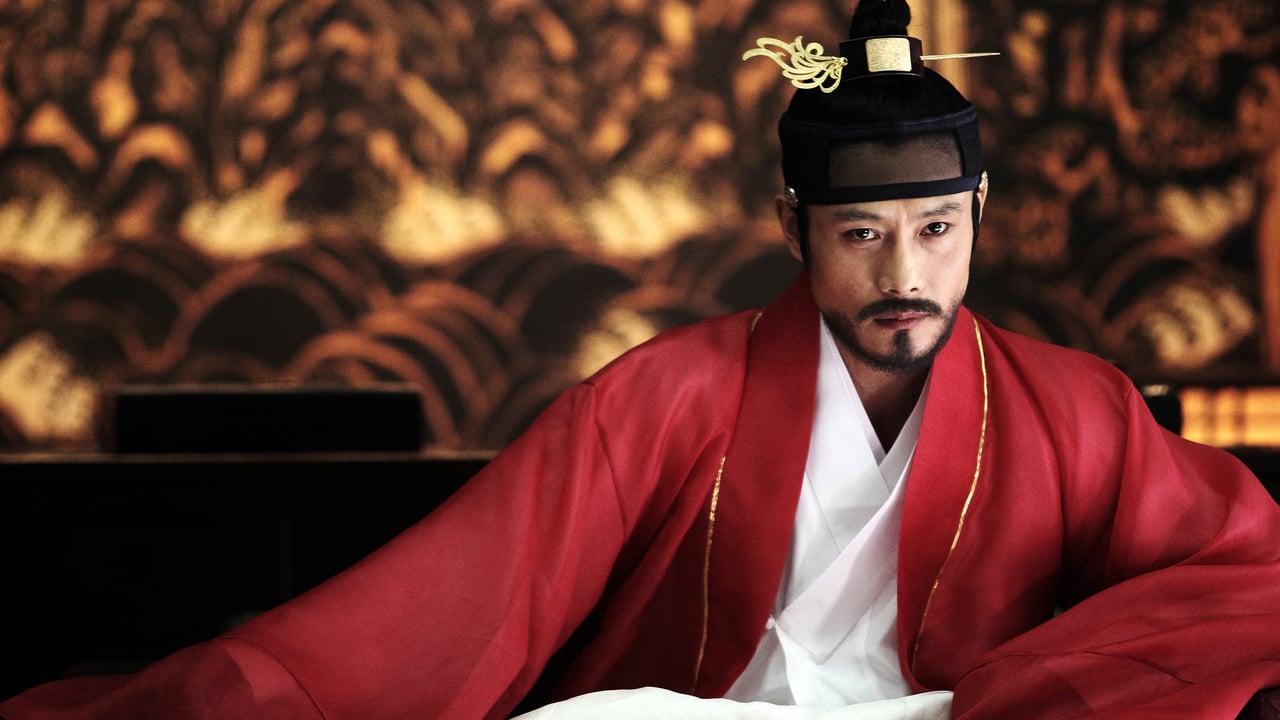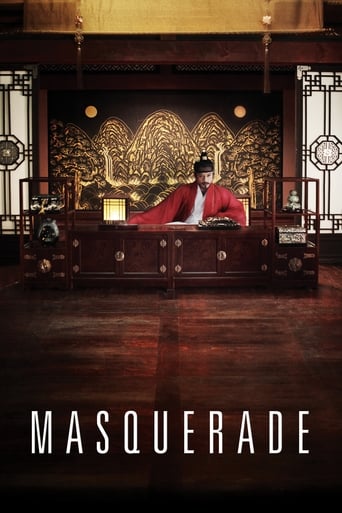



Gripping story with well-crafted characters
Awesome Movie
There is just so much movie here. For some it may be too much. But in the same secretly sarcastic way most telemarketers say the phrase, the title of this one is particularly apt.
View MoreThis is a must-see and one of the best documentaries - and films - of this year.
View MoreThis movie is the reason why I love cinema so much. A beautiful film that conveys so much emotion from you, I cried so much during this movie. Every actor did an amazing job but the main character showed some serious acting chops with his performance. When the scenes switch between the impostor and the real king, you don't for a single second think "Oh it's the same guy". It's two completely different and separate people despite being played by the same actor, now that takes some serious acting skills to pull off. The cinematography, sets, costumes, script, and everything was perfect. I hoped that the ending would have turned out different but being that it's a historical movie, it can't be helped. I don't usually like historical movies aside from WW2 movies, but this one is now my absolute favorite. Before watching, I knew literally nothing about Korean history but this movie has definitely made me a fan. Would recommend to anyone who likes inspiring, beautiful, funny, and emotional films.. so basically everyone. An easy 10/10.
View MoreWell this movie is not meant to be hidden! I know enough history to recognize that the two faces of the ancient god Ianós have no relevance to bad or good or prince Gwanghae or the dual role of Byung-hun Lee.But the acting of the latest is surely godlike.Byung-hun Lee plays the part of Gwanghaegun the fifteenth king of the Joseon Dynasty and this movie is a work of fiction created around a quote that I love , "Do not put on record what is meant to be hidden".The plot of the movie is the following.The king, afraid of his life during rumors of assassination attempts, searches for a man that looks like him and can replace him as long as the danger for his life remains.What follows is a masterpiece.Great actors,great direction and great costumes create a drama worth anyone's time.Do not miss it.
View MoreIt's a period drama called "Masquerade", also as "Gwanghae – the man who becomes the King". It is a real story of an infamous tyrant king, but he was a good politician who helped restoring his country which had been ravaged by the war with Japan and also secured the country from the Qing Dynasty of China for a while through his practical diplomatic policies. Now he is mostly regarded as a wise king unluckily stuck in the domestic political feuds which turned out to be the main cause of his undoing, and many historians say Joseon would have not suffered two disastrous invasions by the Qing Dynasty if he had not been dethroned by a coup in 1623.We can witness many resemblances of "Kagemusha"(1980) and "Dave"(1993) in Masquerade. As getting involved in the political feuds at his court, King Gwanghae(Lee Byeong-heon), has been nervous about possible assassination attempts, so he needs a double for protecting him from constant danger. The king's adviser, Heo Gyun(Ryoo Seung-yong), finds a suitable man for the job. He is a clown named Ha-seon(also played by Lee Byeong-heon), and he has been earning a living through his silly antics imitating the king in front of people. Ha-seon got trained and adequately does his job as ordered while the real king is having his own private time outside the court, but he is soon assigned with a far greater task. The real king suddenly loses his consciousness due to poison, situation becomes worse and Heo Gyun demands Ha-seon to disguise himself as the king for a while to deceive others at the court. Ha-seon is reluctant, but he quickly accepts his plan because he is promised that he will be paid well. The feel is good to see a Jovial type king rather than a stern, under the guidance by Heo Gyun and the king's eunuch. As Heo Gyun instructed before, all he has to do is just sit in the King's chair and act like him. Though the people at the court are a little confused by sudden changes in His Majesty's behaviors, Ha-seon playing really good. Even the Queen and his personal bodyguard believe him, but Ha-seon crossed his line this creates an enmity between the haters in the own courtyard. Even though he belongs to a lower caste, but he is a smart guy who can read and learn, so he becomes more active than before at the council with his high-ranking officials.As we awaiting eagerly the king regains the consciousness and it makes the situation Orphic and it heads to a terrific climax. Lee Byeong-heon, Ryoo Seung-yong and some part timers really build the film in to a Class.TWO THUMBS UP!
View MoreThis much is history – in the eighth year of King Gwang-hae's reign during the 17th century Joseon dynasty, there was a sudden reversal of policies that had favoured the aristocracy. Suddenly, the wealthy were made to pay more taxes and the same burden lightened on both the peasants as well as the middle-class. The noble were also ordered not to exploit the poor as slaves, lest they face the wrath of the King. Strangely enough, it is during this period that the Annals contain fifteen missing days, preceded by an intriguing entry that reads 'one must not record that which he wishes to hide'.Inspired by this fascinating set of events, director and co-screenwriter Choo Chang-min imagine a fantastical scenario along the lines of Mark Twain's seminal novel 'The Prince and the Pauper' and Ivan Reitman's political satire 'Dave' where a look-alike commoner swaps places with the King and thereby institutes badly needed ground-up reforms. The excuse for such a body swap? The threat of assassination, which in the opening minutes is shown leaving King Gwanghae spooked and doubting the trust of even those closest to him – the Queen and her brother Yoo Jong- ho.Under his orders, his loyal Chief Secretary Heo Gyun (Ryoo Seung-yong) finds a doppelganger in Ha-seon, a jester at a courtesan's place who impersonates the King for popular amusement. Barely after his audition, Ha-seon is thrust onto the throne when the King is poisoned and falls unconscious, leading the Chief Secretary to activate the former so that the country does not descend into chaos. What ensues is an enthralling mix of comedy and drama done with a lot of heart, all three elements combining to render this one of the very best Korean films we have seen in a long while.Indeed, the experience that Chang-min invites his audience to partake is similar to Ha-seon's own transformation. Not used to the life of royalty, Ha-seon initially struggles with its customary practices – most notably the lack of privacy – and like the awkward adjustments he has to make, the first half of the film goes for a light-hearted tone with generous but genuine laughs. A particular laugh-out-loud sequence has him failing to understand the inordinate amount of attention paid to the daily movement of his bowels, but most of the humour is more subtle but no less amusing – especially a running gag where his regular closed-door meetings with the Chief Secretary are interrupted by the need to perform an abrupt switch of positions when his night snack is delivered.Even in these early moments, it is clear that Ha-seon has more empathy than the real King ever had. This is portrayed in both the smaller moments – after learning that his leftovers go towards feeding the Royal servants, Ha-seon specially eats only a basic bowl of bean gruel to leave the rest of the dishes to those who prepared it – as well as a more fully fleshed arc that sees him try to restore the rightful presence of the Queen (Han Hyo-joo) in relation to the throne. It is also a perfect precursor for Ha-seon's subsequent transformation, as he grows increasingly unwilling to be just a puppet for the Chief Secretary.Instead, Ha-seon begins to rule by common sense, putting in place badly needed reforms so swiftly that they stun the rest of his political circle. More importantly, he ends up antagonising the very traitors who had masterminded the King's poisoning, setting the stage for a gripping showdown where not just his identity but his very life is on the line. And yet even in the face of clear and present danger, Ha-seon shows unexpected mettle, choosing instead to stand firm for his beliefs and decisions rather than scuttle away to safety, earning the admiration of the Chief Secretary and the Chief Eunuch (Jang Gwang) who realise that Ha-seon was an even better ruler of the people than the King himself.Though Chang-min provides a steady directorial hand to the compelling tale, what truly knocks it out of the park is Lee Byung Hun's bravura acting, holding the screen with poise and charisma. As King Gwanghae, he is arrogant, petulant and utterly contemptible; but as Ha-seon, he is lively and charming at the beginning and affectionate and empathetic later on. One of the best – and most touching – scenes in the whole film has Ha-seon agreeing out of resignation to his advisers' proposal for 20,000 men to be essentially sent to their death to help the Ming dynasty and then retracting it with a most forceful proclamation of his duties as a King of the people; that very sequence a perfect illustration of Byung Hun's regal performance.Outstanding in their own right too are the various supporting acts, including Seung-yong's righteous Chief Secretary who eventually finds himself caught between a rock and a hard place and Jang Gwang's Chief Eunuch who begins to have a change of heart about the masquerade when he sees the goodness in Ha-seon's rule. Rare is the film that is wonderfully acted by every single cast, and one supposes that this is testament to the power of Byung Hun's own leading anchor.The top-notch quality of the production is also evident in the sumptuous sets and lavish costumes, which add class and pomp to a brilliantly acted, cleverly scripted and confidently directed film. All the jokes and intrigue isn't just for entertainment; indeed, its message of justice, benevolence and fairness is as true to the rule of governance today as it is four hundred years ago. That relevance gives it real heft, and whether you are a fan of period dramas, we urge you to see what we think is one of the finest Korean movies we have seen, brilliant and beautiful in its humour, poignancy and most of all, heart.
View More